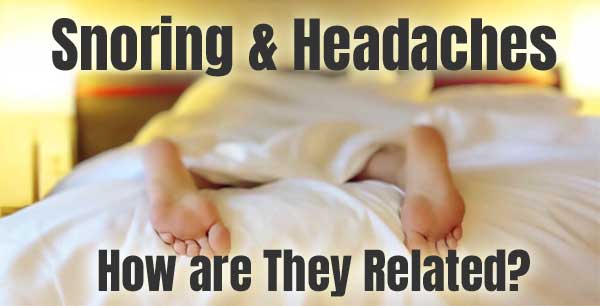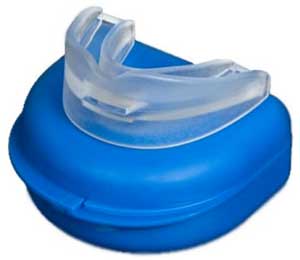Do you suffer from snoring and early morning headaches? One may be causing the other, but how exactly are snoring and headaches related?

In an 800-person sleep disorder study reported on WebMD, 35% of participants complained of morning headaches. Consequently, 67% of these people had sleep apnea.
In addition, 81% of participants who both snored and experienced morning headaches had sleep apnea. Therefore, if you snore and have morning headaches, you may want to contact your doctor and get tested.
In fact, Dr Dawn Marcus MD says that people who have migraines often suffer from sleep conditions as well. She outlines a study that included 11 sleep apnea patients who also experienced migraine headaches.
All patients were treated with CPAP devices, and as a result improved their sleep quality. Furthermore, 10 of the 11 people resolved their migraine headaches altogether, and one person minimized migraines substantially.
What Studies Say About Snoring and Morning Headaches…
 If you want to fix chronic morning headaches, take a look at your sleep. The connection between snoring and migraine headaches presents itself more often than people think.
If you want to fix chronic morning headaches, take a look at your sleep. The connection between snoring and migraine headaches presents itself more often than people think.
Plus, by getting better sleep, you can improve a variety of health issues and have more energy during the day.
On the other hand, a study on PubMed reported that “lack of relationship between tension-type headache and obstructive sleep apnea in the general population”. (Although, they did state that several other previous studies had shown an association between sleep apnea and headaches.)
Sleep.org says that getting too little sleep can trigger headaches. Therefore, it makes sense that activities that disrupt sleep, such as snoring, can be the culprit.
What Else Could Cause Sleep-Related Headaches Besides Snoring?
 Teeth grinding (bruxism) or a strained neck position may cause your morning tension headaches. You may find the solution to be as simple as a mouthpiece or different sleep pillow to re-align your head and neck.
Teeth grinding (bruxism) or a strained neck position may cause your morning tension headaches. You may find the solution to be as simple as a mouthpiece or different sleep pillow to re-align your head and neck.
Interestingly, these sleep remedies actually help prevent snoring as well.
Along those lines, sinusitis can cause both snoring and headaches due to clogged nasal passageways.
 Clearing these airways can often prevent mouth breathing, snoring and sinus headaches all at once.
Clearing these airways can often prevent mouth breathing, snoring and sinus headaches all at once.
Some people use decongestants, Neti Pots or a nose piece for snoring.
In addition to snoring, The Headache Journal reports that headaches can result from a variety of other sleep disorders.
For example, insomnia, daytime sleepiness and circadian rhythm disorders can create a risk.
Decreasing the Frequency of Snoring and Headaches – Naturally
Jeanetta Rains, PhD says that people who suffer from headaches have a chance of developing a sleep disorder 2-8 times greater than the average person. When the frequency of headaches increases, so can sleep problems.
 Inversely, getting more (and better) sleep can lessen the occurrence of headaches. Hence, if you suffer from snoring and headaches in the morning, may may be able to solve both health issues at once by fixing your sleep.
Inversely, getting more (and better) sleep can lessen the occurrence of headaches. Hence, if you suffer from snoring and headaches in the morning, may may be able to solve both health issues at once by fixing your sleep.
To get rid of snoring, people often try inexpensive remedies such as nose pieces, anti-snore pillows and mouth gear.
Dr Rains also suggests establishing healthy sleep habits, like avoiding caffeine and television before bed.
In addition, having a consistent bedtime in a dark room can also help improve sleep quality. In fact, the Michigan Headache and Neurological Institute says that changes in sleep schedule can impact cluster headaches significantly. They recommend taking 9mg of melatonin at bedtime and, of course, sticking to a regular sleep schedule.
